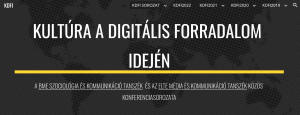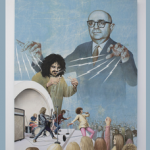KDFI 2022
KDFI 2022: Culture in the Time of the Digital Revolution Conference
Pop culture and politics.
The conference deals with the multifaceted relationship between popular culture and politics. In late capitalist mediatized societies, Western-type democracies have undergone significant changes, which have been intertwined with the mediatization, popularization of the political field, and the politicization of community identities. At the same time, it can be said that popular culture is not only a field of consumption and entertainment, but also a field for the formation of community identities and a contemporary medium for the transfer of knowledge. The conference would like to reflect on the global processes that also influence Hungarian relations, on the one hand, and on the local specificities, on the local specificities of the relationship between politics, popular culture, and digitalization, on the other. At the latest meeting of the conference series, we will focus on three main areas regarding the intertwining of popular culture, media and politics: on the one hand, we will ask about the diverse forms of political instrumentalization of popular culture and the interaction between the two areas, on the other hand, we would like to examine how popular culture embeds the rise of different political discourses and how it channels different emotions, and thirdly, what is the relationship between the construction of political hegemony and the taste hierarchies, cultural and value regimes, and the sociality of cultural consumption and production embodied through popular culture.
- Tibor Bárány (BME) Attila Bátorfy (ELTE) Péter Csigó (BME) Anna Gács (BME) Rita Glózer (PTE) Gábor Hamp (BME) Veronika Hermann (ELTE) Péter L. Varga (ELTE) István Szakadat (BME) Tamás Tófalvy (BME) Orsolya Hanna Vincze (BBTE) Anna Wessely (ELTE) - Program Committee
- Sándor Hites ELKH Humanities Research Center Keszeg Anna Babeș–Bolyai University Ádám Ignácz ELKH BTK Institute of Musicology László Péter Babeș–Bolyai University - Invited speakers
Conference program:
February 17, 2022 (Thursday),
9:00–9:20 Welcome
Section Chair: Emília Barna (BME)
9:20–10:00 Plenary lecture I.: Ádám Ignácz (ELKH ZTI): Political and diplomatic history considerations for the analysis of popular music arrangements
10:00–10:40 Plenary Lecture II.: Anna Keszeg (BBTE): Contemporary fashion from identity politics to environmental politics
11:00–12:30 First section Section chair: Tibor Bárány (BME) 1.1. Annamária Torbó (PTE): Harry Potter Hungary as an alternative cultural-political scene 1.2. Szabolcs Dániel Radnai (PTE): Does pop culture have a memory, and if so, whose? (Pop-rock music, cultural memory, memory politics) 1.3. Ágnes Farkas (ELTE): Punk and politics – Punk musicians in the web of politics
14:00–15:30 Second section Section chair: Tibor Bárány (BME) 2.1. Attila Bátorfy (ELTE): Data representations in political iconography 2.2. Réka Benczes and Lilla Szabó (BCE): It's showtime: Negative campaign in Fidesz's communication 2.3. Zsófia Bauer (BCE): Politician eater – Tripe or blackberry galette? The symbolism of food and eating on politicians' social media pages
15:50–17:20 Third section Section chair: Ágnes Patakfalvi-Czirják (BME) 3.1. Szilvi Német (ELTE): Political astroturfing: “the people of the internet” in the service of digital populism 3.2. Mihály Szilágyi-Gál (ELTE): From the politics of apoliticism to the apoliticism of politics 3.3. Norbert Merkovity (SZTE): Attention-based politics February 18, 2022 (Friday), room QA406 Section chair: Ágnes Patakfalvi-Czirják (BME) 9:00–9:40 Plenary lecture III.: Sándor Hites (ELKH ITI): On the political economy of “national literature” in the 19th century 9:40–10:20 Plenary lecture IV: László Péter (BBTE): Football with a thousand faces. Outline points for the sociological study of the phenomenon of football
10:40–12:10 Fourth section Section chair: Veronika Hermann (ELTE) 4.1. Katalin Baráth (SZTE): Personal and institutional politics in pop culture production – from a historical perspective. Justification procedures of actors in the Horthy-era motion picture industry (1945–1948) 4.2. András Fodor (SZTE): The rhetoric of emancipatory spatial changes in China Miéville’s The Council 4.3. Balázs Varga (ELTE): Socialism never existed – the heating up of the Cold War in contemporary Eastern European films and series
13:30–15:00 Fifth section Section chair: Veronika Hermann (ELTE) 5.1. Zsuzsa Plainer (ISPMN): Operetta and state communist cultural policy in Oradea – a theatre sociology study 5.2. Júliusz Huth (KEMKI): Hungarian Salon – The conflicts between the Hungarian Association of Fine and Applied Artists and the Műcsarnok in the nineties 5.3. Eszter Őze (KEMKI): From pedagogy to social engineering: Social/Public Health Museum, Budapest and Gesellschafts- und Wirtschaftsmuseum, Vienna
15:20–17:20 Sixth section Section chair: Anna Gács (BME) 6.1. Csaba András (PTE): Naturalization and popular culture 6.2. Emília Barna (BME): Music of the masses: the Orbán regime’s construction of hegemony through musical taste and aesthetics 6.3. Ágnes Patakfalvi-Czirják (BME): Radicalization, folklorization and consecration: the history of the song “Nélküled” by Ismerős Arcok through politics 6.4. Reinhardt Radnai: Are there still Hungarian countercultural movements? Reflection through the examination of the structural development of the domestic hip-hop scene
17:20–17:30 Closing remarks


